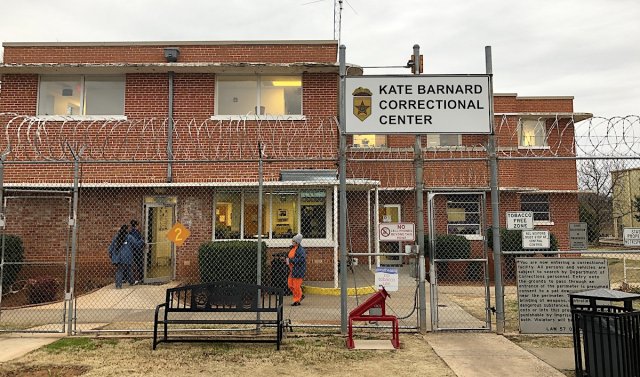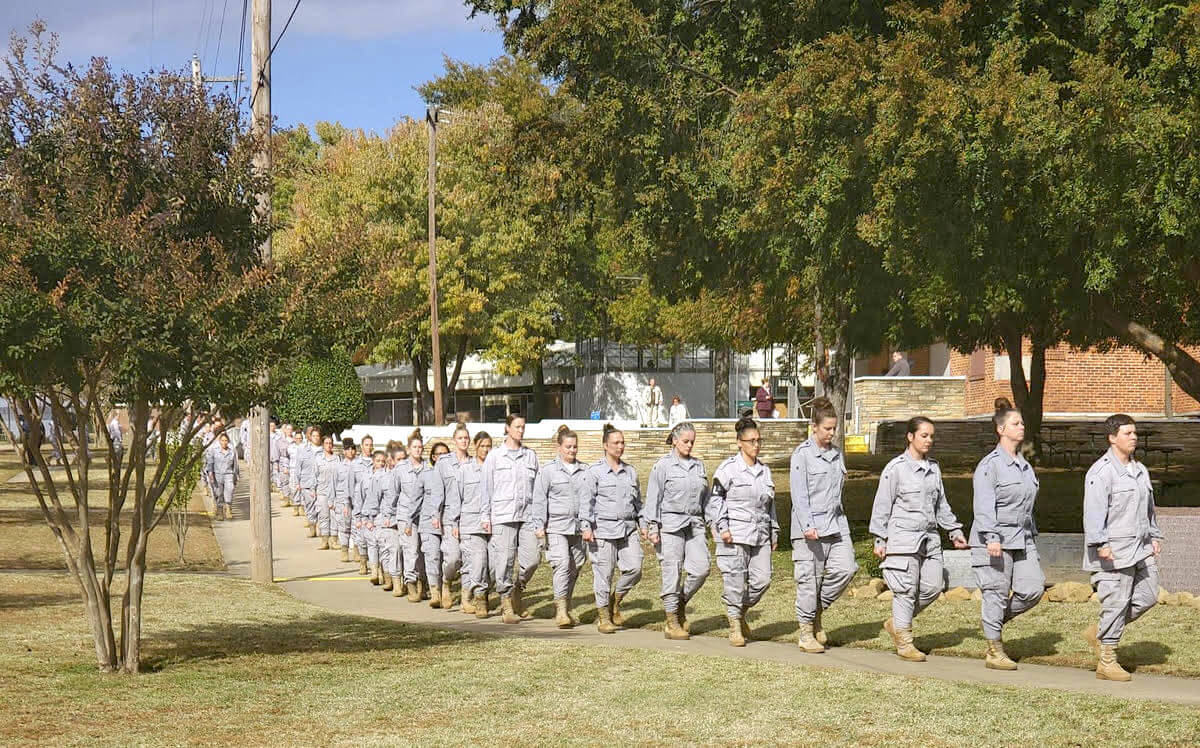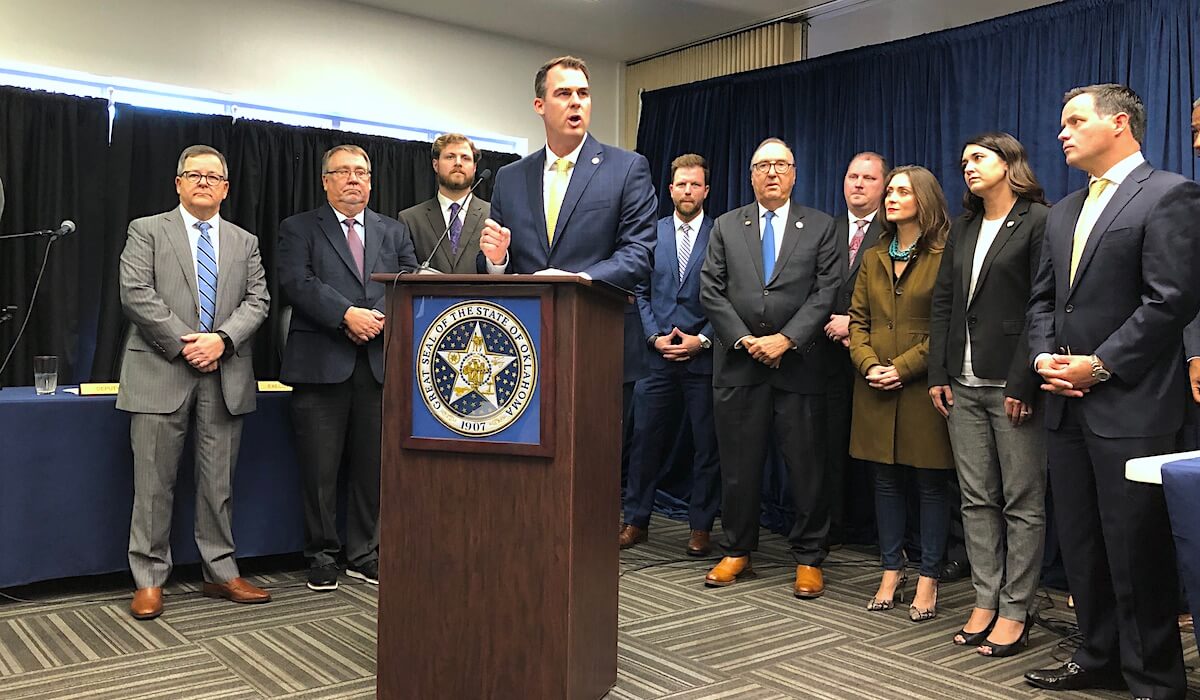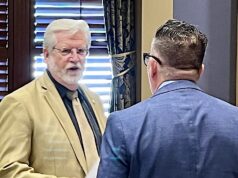
The Oklahoma Department of Corrections has four contracts with private telemarketing firms that operate call centers in six state prisons. The companies pay DOC a $7.25-per-hour minimum wage for each of more than 200 incarcerated individuals, but the prison telemarketing program only pays workers $1.45-per-hour plus whatever bonuses are offered by the companies.
NonDoc obtained the contracts — which date back to at least 2014 — from DOC in recent weeks. Asked about the low pay rate for private telemarketing done through DOC’s Oklahoma Correctional Industries, leading members of the Oklahoma Legislature and Gov. Kevin Stitt’s administration said they had never heard of the contracts.
“I would have no issue with the department keeping some of the revenue to run the cost of the program, but paying the inmates 20 percent is ridiculous,” said House Majority Floor Leader Jon Echols (R-OKC). “This not only hurts inmates, but many of these inmates have outside expenses — things like child support or restitution paid to victims.”
Echols owns a staffing company in the health care arena, and he noted the industry average for call center jobs is at least $11-per-hour.
“By not paying them a fair wage, you’re not just hurting inmates. You’re hurting victims who can’t get paid their restitution, and you’re hurting children whose parents are not getting paid their child support,” Echols said.
Sen. George Young (D-OKC) also expressed frustration with DOC’s private telemarketing arrangement.
“That’s heartbreaking,” Young said of the $1.45-per-hour wage. “These people are incarcerated, but we take advantage of them because we’ve got control of them?”
The four DOC contracts — with ProCom, Every Life Marketing, Greenwave Concepts and Case Energy Partners — specify that the state agency pays for call center overhead such as electricity, water, air conditioning, maintenance, furniture and other workplace components.
“It goes against everything I think I’m trying to fight for,” said Young, a staunch advocate for criminal justice reform who has also filed legislation to raise Oklahoma’s minimum wage. “We’re subsidizing the mistreatment of our citizens.”
‘We give them high-level sales training’
Toby Pedford, co-founder of Every Life Marketing, doesn’t quite see it that way.
Of the four companies with Oklahoma Corrections Industries telemarketing contracts, Pedford’s insurance marketing company is the only one based in Oklahoma. After contracting with DOC in February 2016, Every Life currently works with four inmates doing inbound and outbound marketing at James Crabtree Correctional Center in Helena.
“One of my number one objectives is that they do a good job, just like with anyone,” Pedford said. “But I also want them to have a skillset so that when they get out they can make a good living. We don’t just teach them, ‘This is how we want you to make phone calls.’ We give them high-level sales training that costs thousands and thousands of dollars.”
But like state legislative leaders, Pedford did not know how much of the $7.25-per-hour he pays to DOC ends up with his workers.
“I know they get a portion of it, but I’ve not known what the portion is,” Pedford said. “The bonus — we know — goes directly to them. That’s what they told us.”
Pedford said the bonus structure used by Every Life relies on multiple benchmarks and can reach an additional $4-per-hour.
“At the beginning we tried to figure out how we can take the best care of these guys,” he said. “We’re not in a system that we can control, so you try to do the best that you can.”
While Pedford said none of the men his company works with has been released from prison yet to seek future employment, he said they work hard, are happy to get out of their cells and are appreciative of any extra hours or training Every Life can provide.
“They’re hungry for the knowledge,” he said. “They love to learn, and we can give it to them.”
‘An inquiry needs to be made’

Asked about Oklahoma’s prison telemarketing contracts, every lawmaker interviewed for this story said they also want to learn more — from the Department of Corrections.
“I was unaware of the particulars as described, and it certainly would seem that an inquiry needs to be made to gather more facts,” said House Appropriations and Budget Chairman Kevin Wallace (R-Wellston). “The question is whether the taxpayer is being best served in an appropriate manner.”
Gov. Kevin Stitt’s office also wants to learn more about the prison telemarketing contracts, said Stitt senior policy advisor Donelle Harder.
“The governor supports opportunities and programs that teach Oklahoma’s inmates life skills in preparation for their release and return to society,” Harder said.
But the $1.45-per-hour pay rate is “in review,” she said.
“The governor’s office is looking further into these particular contracts and the justification made at that time,” Harder said.
DOC public information manager Matt Elliott said Thursday that staff needed to research how and why the $1.45-per-hour pay rate was established.
“The rate was set a while back,” Elliott said by email.
House Minority Leader Emily Virgin (D-Norman) also has concerns about the prison telemarketing contracts, and she pointed to Oklahoma’s high incarceration rate and recent state budget problems.
“I think the choices of policy makers have put DOC in this position of trying to find other ways to fill holes in their budget because we are incarcerating so many people and are not making smart decisions in criminal justice,” Virgin said. “Do I think it’s appropriate for someone to be profiting off of essentially free prison labor? No, but I put the blame in the hands of policy makers, not businesses.”
For his part, Pedford said assumptions about his company finding a windfall through the DOC telemarketing program would be inaccurate.
“If I’m being 100 percent honest, it’s been a pretty substantial loss,” Pedford said. “I do believe in the project. I think there’s a lot of hope for it. Our guys are great, and I believe in them.”
Companies pay DOC different rates for training
The state’s four prison telemarketing contracts each stipulate a different payment rate for employee training. In addition to Every Life, the other three companies that operate call centers inside Oklahoma minimum and medium-security prisons are:
- Case Energy Partners, a Dallas-based “privately funded energy investment company that acquires and manages oil and gas interests”;
- Greenwave Concepts (DBA: TruEnergy), “one of the country’s largest energy brokers” based in McKinney, Texas;
- ProCom, a New Jersey company whose mission is “to provide lower cost call center services as an onshore alternative to off/near shoring.”
Shortly before Christmas, The Intercept published a story about the campaign of 2020 Democratic presidential candidate Michael Bloomberg using a subcontractor who employed ProCom to make calls. The story produced a series of national headlines.
ProCom’s contract dates back to September 2014, the earliest Oklahoma prison telemarketing agreement NonDoc has identified. Like its counterparts, the contract featured a term of five years. It was renewed in November 2019 and specifies that ProCom will pay DOC $3.25-per-hour during a two-week training period for employees.
Founded by Louisiana insurance broker John Scallan, ProCom operates call centers at Eddie Warrior Correctional Center in Taft and Mack Alford Correctional Center in Stringtown. According to Elliott, the DOC spokesman, 97 female inmates at Eddie Warrior and 36 male inmates at Mack Alford currently participate in the ProCom program.
RELATED
‘The will of the people’: Stitt to sign record number of commutations by Tres Savage
Since May 2018, Case Energy Partners has run its prison telemarketing call center out of James Crabtree Correctional Center. Over a newly hired employee’s first eight weeks, the company reimburses DOC at a rate of $3.65-per-hour. (Every Life’s contract specifies a two-week training period during which the company pays DOC $3.75-per-hour.)
Initiated in December 2016, the Greenwave Concepts contract features a similar eight-week training period for newly hired prisoners, but the company only pays DOC $3.15-per-hour over that time. The contract says the company will employ at least 45 inmates at Mabel Bassett Correctional Center in McLoud, 40 inmates at Joseph Harp Correctional Center in Lexington and 25 inmates at Kate Bernard Correctional Center in OKC.
Messages left for representatives of ProCom, Greenwave Concepts and Case Energy Partners were not returned by the publication of this story.
‘What is disturbing is the rate they are paid’
Elliott, the DOC spokesman, declined to make agency officials available for an interview about Oklahoma’s prison telemarketing program and the private company contracts (linked below). NonDoc asked Elliott on multiple occasions if the DOC could provide a statement discussing the value it sees in the private telemarketing contracts, but no statement was provided by the publication of this story.
DOC notes on its Oklahoma Correctional Industries webpage that more than 1,100 prisoners are employed in 31 operations at 11 facilities. They work in 15 public sector industries as well as 16 private sector “partnerships.” DOC’s website also notes:
Those inmates having institutional job assignments are paid up to $20 per month. Some inmates with special skills and good behavior may receive more pay working for Oklahoma Correctional Industries (OCI). Paying inmates is as an incentive to perform well and ensures they have money to purchase personal items from the canteen.
Young, who said every aspect of America’s criminal justice system disproportionately affects people of color, said he was extremely concerned by the $1.45-per-hour pay rate. Just to make a single phone call while incarcerated, Oklahoma inmates pay at least $3.
“I think I have a responsibility to contact DOC and ask them for more information,” Young said. “I think I have a responsibility to contact the attorney general and ask if it’s illegal. And thirdly, I need to ask the governor if he is going to evaluate this.”
With the Stitt administration confirming they will review the prison telemarketing contracts, Young said the way Oklahoma treats the least among us “still impacts everyone.”
“That’s right, they are prisoners,” the senator said. “But we now determine the value of a human being by the decisions they’ve made in their lives, and based on that we can misuse them and mistreat them?”
Virgin said work training programs are important for the incarcerated so they can be prepared to find employment after serving their sentences.
“I think call centers are probably a great way to get some experience for a job you might get when you are released from prison,” she said. “So I don’t necessarily have a problem with incarcerated people making phone calls. What is disturbing is the rate they are paid.”
Pedford, the Every Life Marketing co-owner, said the telemarketing program ultimately can help people learn skills to earn “a living wage” once they get of prison. But if politicians want the inmates’ percentage of what he pays DOC to be higher, he has no problem with it.
“If they want them getting a higher share of the money — if that’s the thing — I would say, ‘OK. Alright. I really don’t even know about that,'” Pedford said. “I’m not opposed to that, I just don’t control it. But I’m not opposed to it at all. That’s part of why we pay them more (through bonuses).”
Pedford said his company makes sure its incarcerated workers do not have access to people’s private information, and he said they prefer working in the call center than in other parts of the prison or even outdoors.
“Even though sometimes it may not be as cost effective as you hope, you’re doing something good,” Pedford said. “The (DOC) people that I’ve encountered that work with us on this stuff, they really care about these folks and really want to see them have a pathway to accelerate their lives later, or to honestly just kind of keep their sanity while they’re there.”
Echols said he hopes attention brought to the private telemarketing contracts helps further positive changes he has seen at the agency in recent months.
“These contracts were (mostly) signed under a previous administrator, and (new DOC) director (Scott) Crow does have my support,” Echols said. “I would hope in the future — as someone who has shown renewed interest in re-entry programs — he would also look at things like this.”
The federal minimum wage became $7.25-per-hour in 2009, but prisoners are not covered by the U.S. Fair Labor Standards Act. As such, the use or subcontracted use of low-wage prison labor by large companies has been a controversial subject for decades.
Follow @NonDocMedia on:






















